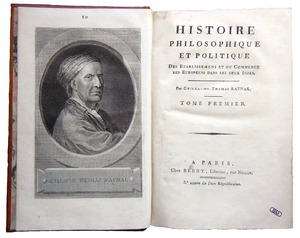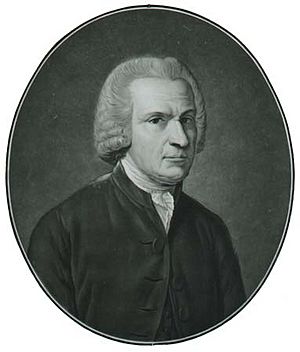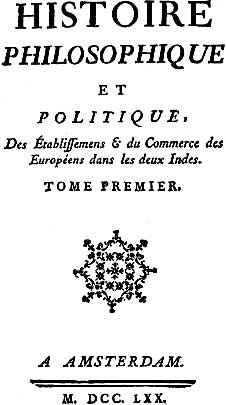Guillaume Thomas François Raynal facts for kids
Guillaume Thomas Raynal (born April 12, 1713 – died March 6, 1796) was a French writer and thinker during the Age of Enlightenment. This was a time when new ideas about freedom, science, and human rights were very popular in Europe.
Contents
His Early Years
Guillaume Raynal was born in a place called Lapanouse in Rouergue, France. He went to a school run by the Jesuits, who are a religious group. He even became a priest. However, he later left his religious life to become a writer and journalist.
Raynal wrote for a famous French magazine called Mercure de France. He also created several popular books, which he published and sold himself. These early works helped him become known in important social gatherings, or "salons," where famous thinkers and writers met.
In 1754, he became a member of the Royal Society in London, which is a very old and respected group for scientists. Later, in 1775, he joined the American Philosophical Society.
The Famous Book: Histoire des deux Indes
Raynal's most important work was a book called L'Histoire philosophique et politique des établissements et du commerce des Européens dans les deux Indes. This long title means "Philosophical and Political History of European Settlements and Trade in the Two Indies." It was published in 1770.
What Was the Book About?
This huge book explored how European countries set up colonies and traded in different parts of the world. It covered places like the East Indies (Asia), South America, the West Indies (Caribbean), and North America. The book also discussed important topics like trade, religion, and slavery. Raynal looked at all these subjects from the viewpoint of the French Enlightenment, which focused on reason and human rights.
Many other famous thinkers, including Diderot, helped Raynal write parts of this book. It was very popular and was updated and printed many times. It was even translated into several languages.
Raynal's Strong Stance Against Slavery
One of the most powerful parts of the book was Raynal's strong criticism of slavery. He believed that no government should allow slavery. He wrote that anyone who supported such a cruel system deserved to be ignored by thinkers and even attacked. His words helped spread the idea that slavery was wrong and should be ended.
Because of its bold ideas, especially about government and freedom, the book was banned in France in 1779. Copies of the book were even burned in public, and an order was given to arrest Raynal.
His Later Life and Views

After his book was banned, Raynal had to leave France. He went to places like Spa and Berlin. Later, he was allowed to return to France in 1787, but he couldn't go back to Paris.
Raynal was chosen to be a representative for Marseilles in the States-General, which was a big meeting of different groups in France before the French Revolution. However, he was too old to take part.
As the French Revolution began, Raynal became worried about the violence. He had written about big changes, but he hoped for a peaceful revolution. In 1791, he sent a message to the new government, asking them to be less violent with their reforms. During a very dangerous time called the Reign of Terror, Raynal lived quietly in retirement.
In 1795, he became a member of the new Institute of France, a group of important scholars. Guillaume Raynal passed away on March 6, 1796.
A Message to America
After his death, a message from Raynal to the people of the new United States of America was published in 1800. In this message, he gave advice to the young country:
- He warned them about the dangers of too much wealth, which can lead to bad behavior and unfairness.
- He told them not to try and conquer other lands, saying that a country's peace decreases as it gets bigger.
- He advised them to find happiness and health in hard work, and strength in good manners and being good people.
- Most importantly, he stressed the importance of educating children. He believed that good schools would create good leaders, brave soldiers, and honest citizens.
- He also said that freedom should be based on wise laws and that different religions should be allowed without special treatment or persecution.
Raynal hoped that the United States would last as long as the world itself.
See also



